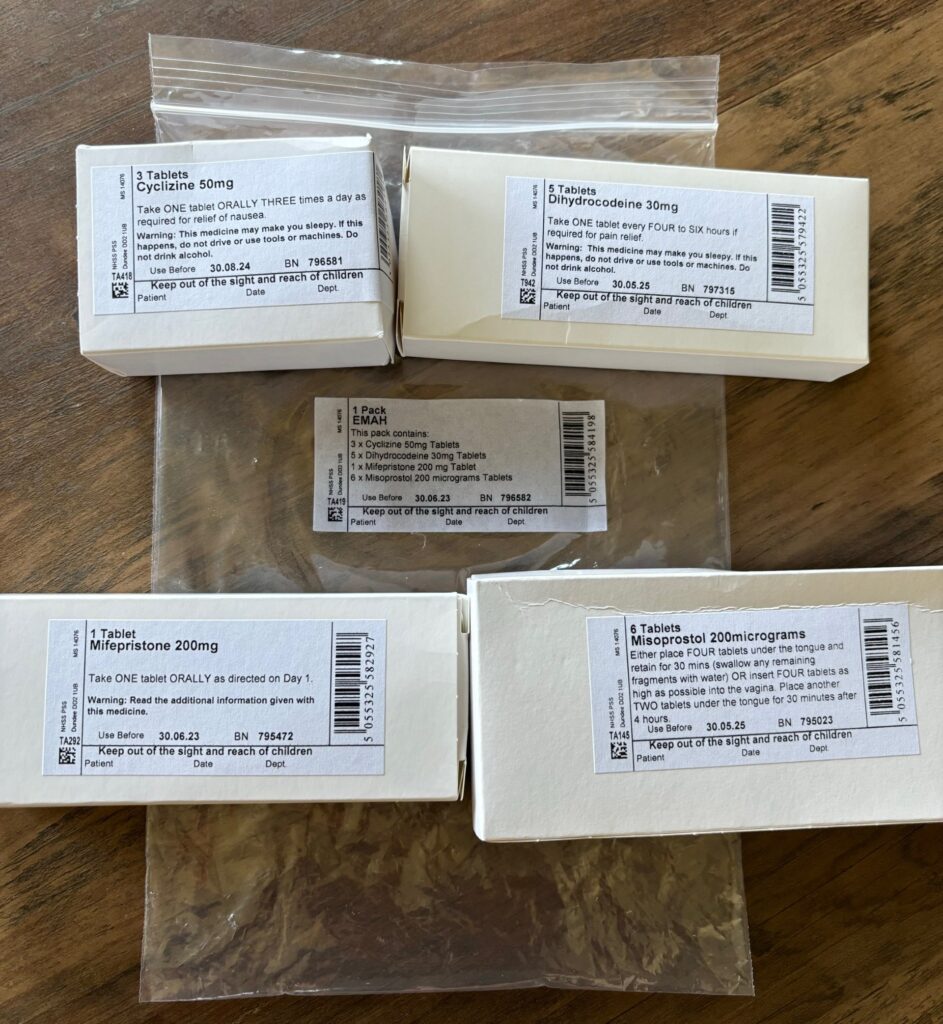By Nathan Burley
Background
Up to seven medicines are provided for an early medical abortion, similar to the amount supplied after a heart attack. Abortifacients, analgesia, an anti-emetic, contraception and an antibiotic could be supplied, with each attendance resulting in at least four packs being given. Clinics providing this service may store a variety of different medications, with staff time spent ordering, receipting, storing, stock rotating, and bagging up the packs. Service demand for abortion care has risen sharply post Covid-19 pandemic in Scotland. Our team proposed consolidating the most frequently used packs into one bag, delivered to the clinic pre-assembled and labelled, greatly simplifying the process.
Creation of the pack
A strict limit to the amount of medicines that can be re-labelled or repackaged by end users is in place in the UK. Individual dispensing and labelling for a patient can be done under the supervision of a pharmacist. However, dedicated units possess licenses that allow for “packing down” and over-labelling of medicines in high volumes. We commissioned NHS Scotland’s Pharmaceutical Specials Service to provide Early Medical Abortion at Home (EMAH) packs that contained the following four medicines (see figure 1):
Cyclizine 50mg x 3 tablets
Dihydrocodeine 30mg x 5 tablets
Mifepristone 200mg x 1 tablet
Misoprostol 200micrograms x 6 tablets
In addition to the medicines, the pack also contains a curated leaflet/information sheet with additional instructions and contact information for the clinic. Leaflets/information sheets can be tailored to each abortion clinic as this pack is now in use within multiple health systems in Scotland.
Figure 1. The contents of the commissioned EMAH pack displayed (without leaflet).
What have the benefits been?
The main benefits have been simplification of medicines handling processes and staff time saved. We estimate that senior medical clinician time saved is approximately 97.5 hours or 2.6 working weeks over a period of 9 months. Time saved per consultation is approximately 5 minutes. This has resulted in a total of 149 hours of clinical nursing and medical time saved which equates to around 4 working weeks for one member of staff. A single line-item in the prescribing system in use also saves medical staff documentation time.
Additionally, because the pack is standardised, the offering of cyclizine (an antiemetic) and dihydrocodeine (a moderate painkiller) is available for patients where the pack is in use. Historically boards would provide a myriad of options with some abortion clinics in Scotland providing no antiemetic or analgesia.
Finally there is a saving of accumulation of pharmaceutical waste or leftovers in patient homes. Pharmaceutical waste is costly to dispose of, presents a risk to the environment, and can lead to patients using medicines to self-treat where inappropriate.
What are the downsides?
The pack contents, for this iteration, have been set and agreed upon by a small working group and for production purposes constituent medicines have been locked in place with no variation. However, a second version is planned with wider stakeholders based on patient feedback and clinical experience with the EMAH pack as it stands.
Negotiating commissioning packs of this nature can be complex and early involvement of a specialist pharmacist was key to the success.
The boxes are all white which could be difficult to differentiate for patients. Additionally, dihydrocodeine may not be suitable for all patients, so the pack is only used in around 70-80% of all consultations. This necessitates individual constituent packs still being present in the abortion clinic with all the usual medicines handling tasks surrounding this storage.
The pack is an item procured from one supplier. The supplier is regularly kept up to date with anticipated demand so that packs can be manufactured accordingly. However, in the event of miscommunication regarding order volumes and quantities, supply can be interrupted with the resulting impact of falling back to making up packs manually.
Summary
The introduction of the pack has brought a considerable amount of time savings to the staff in the clinic and conferred a degree of equity for patients accessing a suitable antiemetic and analgesia for abortion across the country (where used). Patients are given precise quantities so pharmaceutical waste is reduced. There are considerations to account for before adopting a similar approach, but if mitigated sufficiently, there are benefits for both staff and patients.
About the Author
